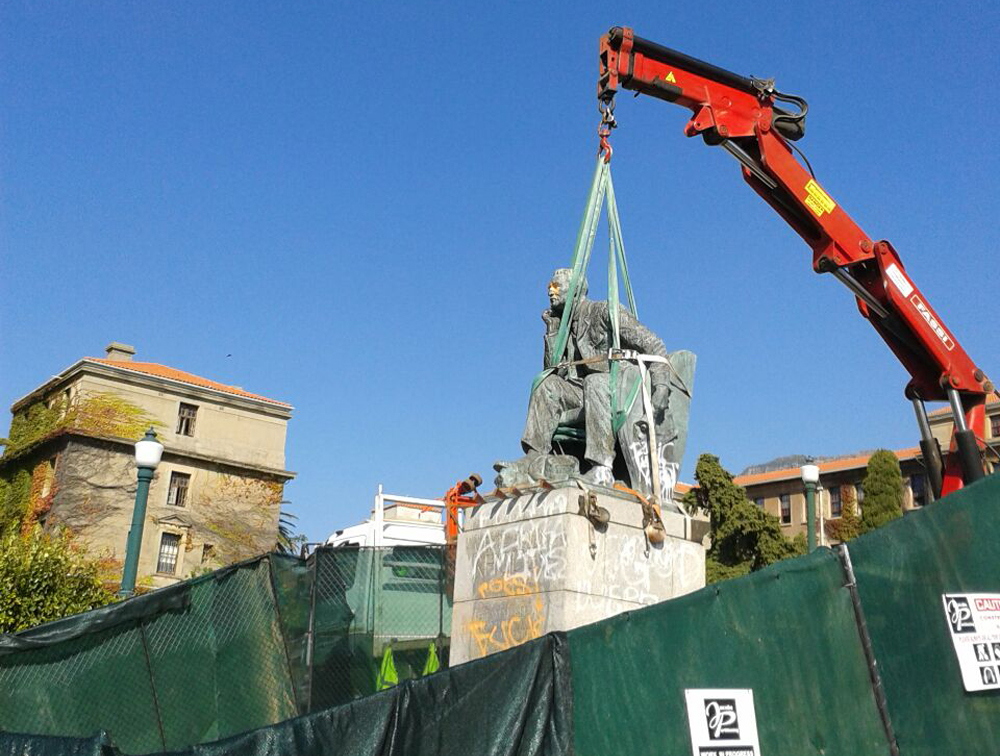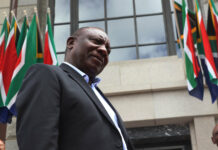In the Weekly Dissident today, Desmond Mlatha and Mphutlane wa Bofelo warn Rhodes Must Fall campaigners of the danger of using civil disobedience as the primary mode of registering political opinions. Instead, they say, students must focus on building a pragmatic and intellectual offensive against the current neo-colonial, neo-apartheid capitalist dispensation.
The Rhodes Must Fall campaign was born within the womb of the broader struggle for transformation in higher institutions and has brought attention to how South Africa deals with the issue of colonials symbols.
The students at UCT have indicated that this was just part of a broader struggle for the transformation of the university and higher education in general, and that they are going to vociferously and actively pursue that agenda.
However subsequent actions and debates around the country seem to shift the focus merely on removing or relocating colonial symbols rather than the primary struggle within which the Rhodes Must Fall campaign was conceived.
The political currency entailed in symbolism makes this more prone to be turned into an arena of theatric populist politics aimed at point-scoring or symbolic expression of power rather than the most important goal of radical transformation.
The danger of using militant and violent acts of civil disobedience as the primary mode of registering political opinions and discontent is that it deflects attention from the construction and building of a more cogent intellectual, theoretical, ideological and programmatic offensive against the current neo-colonial, neo-apartheid capitalist dispensation.
The exploration and presentation of egalitarian democratic socialist alternatives requires a substantial focus on a thorough examination of how the social, political and economic structure, power and social relations, and modes of conceptualising and articulating social reality in the current dispensation continues, and in many cases obfuscates,“rehabilitates†and legitimises the inequities, injustices and discriminations that were constructed and entrenched by settler-colonialism and apartheid-capitalism.
This would allow for an exploration of more co-operative, equitable, just and sustainable ways of living and egalitarian, participatory modes of doing politics and economics.
Redistribution of power and resources
It would, therefore, enable the exposition of the principles that must underpin policy reforms and institutional transformation that can facilitate systemic and structural arrangements geared towards the democratic and egalitarian allocation and distribution of power and resources.
On the contrary, a constricted and jaded preoccupation with the external manifestations and symbolic representations of the legacy of settler-colonialism, apartheid-capitalism and separate development will lead to mere ceremonial and symbolic engagement with the continuity between the settler-colonial and apartheid-capitalist era and the current postcolonial and neo-apartheid liberal capitalist era.
The end result is superficial and artificial interventions devoid of substance beyond the symbolic and feel-good vibes and the proverbial share in the cake for the corporate and political elite.
This symbolic, cosmetic freedom or emblematic engagement with the more complicated challenge of how to bring about radical decolonialisation aimed at genuine physical and psychological liberation of black people is often pursued under the framework of impressive terms such as nationalisation, indigenisation, Africanisation, black economic empowerment and economic freedom.
More often, these serve only as politically correct rhetoric that cushion the interests and agenda of the African political and corporate elites to continue with the social lifestyles and economic and political culture of the former colonisers and their new-found capitalist friends, and to delude the masses into believing that symbolic and cultural things alone can give them a sense of belonging, self-worth and dignity.
Fanon has written extensively about how this manifests itself in the politics and economics of the African political elites and bureaucrats in the post- and neocolonial period. As far as the political economy trajectory is concerned, this takes the shape of substituting white monopoly capital with black monopoly capital under the framework of so-called black economic empowerment and/or with a tripartite alliance between white capitalist, black corporate capitalists and the emergent “bureaucratic capitalists†under the rubric of equity deals. Alternatively, it replaces the colonial and/or foreign bourgeoisie with the local, so-called patriotic bourgeoisie and replaces corporate capitalism with state capitalism.
In the typical style of the neocolonial farce – whereby the masses are generously granted the pleasure to imagine the taste of the grapes as the leadership sip wine in public on the behalf of the public – the visible fruit of this kind of’ transformation that can be presented to the masses is the replacement of the colonial statues and alien street names with faces that look like them and the names they can pronounce.
In short, while the leadership eat the meat, they let the masses live on the metaphoric sausage soup of symbols, proverbs, dictums, anthems, and flags, freedom mementos, tours to the apartheid museums and pilgrimages to Constitution Hill.
But people can only develop a culture worth their salt if the development of that culture is a part of the radical project of social transformation and revolutionary overhaul of the power and social relations.
This is not to discount the importance of using symbols as a means to restore the dignity and pride of a people, but rather a critique of the schizophrenic and disjointed manner of engaging with symbols that divorces this process from the overall project of building a new united and unitary South Africa that takes cognisance of the histories, heritages and collective memories of all its people.
This process has to entail a mix of reparation, redress, restitution, reconciliation and nation-building. Therefore, it has to involve constructive and creative ways of mediating diverse and sometimes conflicting histories and traditions and varied and contrasting memories and emotional attachments to historic and cultural events, figures, and symbols.
Separating culture from colonialism
One of the complexities in the debate on colonial and apartheid-era symbols is the fact that the cultural, political and historical heritage of both the English and Afrikaner people is also embedded in those symbols. So, if we agree that South Africa belong to all who live in it and live by the motto of our country – unity in diversity – how then do we negotiate the process of negating the legacy of apartheid and colonialism without renouncing English and Afrikaner history and heritage?
The real debate should not be whether to destroy or remove colonial and apartheid era symbols, but rather about what place they occupy and how they can be used to educate future generations about the atrocities of colonialism and apartheid.
The history and heritage of our country is constituted by the different histories and heritage of its entire people – good and bad. Erasing or destroying parts of this collective history and heritage will serve no other purpose than to distort our collective history and heritage and deny future generations the chance of knowing our past.
Genuine national unity and eradication of racism, classism and sexism will be achieved through tangible institutional, systemic and structural transformation.
Actions based on sheer vengeance and driven by short-term political point-scoring such as destroying and damaging public statues will not achieve this.
It is not the Afrikaner statues and symbols that are responsible for the continued suffering of black people in our country, but the continuing alliance between the capitalist and the political elites who perpetuate the colonial and apartheid economic structural patterns of development.
Without a sharp focus on a programmatic vision of how to democratise both politics and economy, and a radical policy program that advances a total overhaul of the structures and relations of power, land-ownership patterns and economic relations, the symbolic freedom will be but a mirage.
In that sense it runs the risk of serving only to divert the attention and energy of our people from real concrete struggles about what is wrong with our society today to symbolic struggles against the ghosts from our past.
Desmond Mlatha and Mphutlane wa Bofelo are educators at Workers’ College in Durban. They write this article in their personal capacities.

![Rhodes garbage bags [slider]](https://www.thedailyvox.co.za/wp-content/uploads/2015/04/Rhodes-garbage-bags-slider.jpg)








